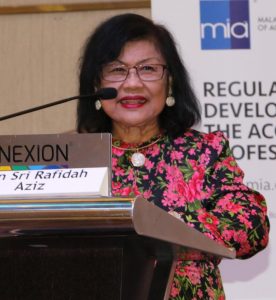By Anis Ramli
Tan Sri Rafidah Aziz tells women accountants to stop competing with men, and instead benchmark performance against the global best, because benchmarks for excellence and leadership are gender, and race neutral.
One of Malaysia’s most iconic leaders, man or woman, Tan Sri Rafidah has accumulated years in leadership, navigating the always choppy waters of international trade, to establish Malaysia as a vocal trade leader and one of the world’s most open economies.
Delegates at MIA’s inaugural Women’s Leadership Symposium 2020 were privileged to hear Tan Sri Rafidah debate the symposium theme of “Lead to Be Equal”, where in her typical iconoclastic fashion she threw the rule book out the window and questioned the defeatist nature of the topic. “Leadership qualities are gender-neutral,” she began, “and by saying ‘Lead to Be Equal’, you (women) are already admitting defeat.” Instead, Tan Sri Rafidah urges women to beat gender stereotypes and self-imposed barriers. “Stop competing with men; benchmark against the global best and know that good leadership qualities are inherent in all of us. Lead to be equal, TO THE BEST.”
Tan Sri Rafidah shares her views on what makes an effective leader:
1. A high level of integrity
Integrity produces results in a positive way and drives effective performance. “Integrity is the main driver for motivation: why you do certain things, the decisions you make, and the actions you take,” says Tan Sri Rafidah. Beyond being just a popular catchphrase, a leader that embodies a high level of integrity inspires trust in others, because he/she is making decisions and actions as they should be made for collective benefit; and not according to self-interest.
 2. Manage one’s self for better discipline
2. Manage one’s self for better discipline
Managing one’s self is as easy as being punctual and adhering to time management. Punctuality is not just about respecting other people’s time, but it also demonstrates one’s ability to self-manage. As Tan Sri Rafidah points out, “How can you manage others when you cannot even manage yourself?” Effective leaders, she says, are those who are skilled at time management and work discipline. In addition, the ability to manage one’s self early in life, keeps a tight rein on what can shape the person as a leader, later on, especially when he /she is at the top. “If you are easily harassed at this early stage, then you will not be in the right frame of mind to lead with calmness and discipline, once at the top,” she stresses.
3. Do not succumb to the “boss” complex
A leader does not equate to being “the boss”. Recognise that a leader is the captain of a ship, and is part of a team. Everyone has a role to assume. If one person fails at performing his or her job properly, the ship can sink. “As a team player, a leader must also be able to galvanise the diverse strengths of the team. He/she must be able to generate collective enthusiasm and passion,” says Tan Sri Rafidah. Demonstrating enthusiasm gets employee buy-in to achieve the set goals and targets, thus making the collective targets and goals something which every team member can relate to, and strive for.
4. Benchmark against the global best
All benchmarks for achievement and performance, must never be confined to merely the small group evaluation, or to standards prevailing at local and domestic levels.
Benchmarking must always be against the global standards, to ensure being amongst the global best and to be in a position to compete effectively, at the global level. “Don’t just be a ‘jaguh kampung’”, says Tan Sri Rafidah. Standards must be set high, to enhance capacity to progress, expand and compete globally. While there is the need to aim for the highest possible acceptable benchmarks, every effort must be made to prepare mindsets, motivation and capabilities to achieve those targets. “Positive and forward-looking mindsets drive performance and allow a person to strive to be amongst the best,” says Tan Sri Rafidah.
5. Be in tune with the younger generation, and have the agility to effect changes and adjustments
Innovation can create the necessary changes, and today, innovation can result in market place disruption, with the introduction of new value networks.
A leader must be future-proof and equipped with the right knowledge to lead, especially in the dynamic operating environment. Generational changes, such as the new Gen Z of the new millennial generation, are manifestations of the new human resources and workforce, as well as the new customers.
One cannot have a work environment that is “as before”, because the younger generation will determine how things will move forward in future. In short, an ever-changing environment requires leaders to pre-empt the next step, and be open and agile in making the required adjustments.






